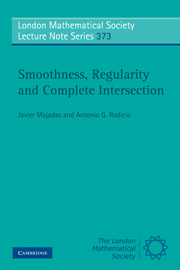Book contents
- Frontmatter
- Contents
- Introduction
- 1 Definition and first properties of (co-)homology modules
- 2 Formally smooth homomorphisms
- 3 Structure of complete noetherian local rings
- 4 Complete intersections
- 5 Regular homomorphisms: Popescu's theorem
- 6 Localization of formal smoothness
- Appendix: Some exact sequences
- Bibliography
- Index
5 - Regular homomorphisms: Popescu's theorem
Published online by Cambridge University Press: 07 September 2011
- Frontmatter
- Contents
- Introduction
- 1 Definition and first properties of (co-)homology modules
- 2 Formally smooth homomorphisms
- 3 Structure of complete noetherian local rings
- 4 Complete intersections
- 5 Regular homomorphisms: Popescu's theorem
- 6 Localization of formal smoothness
- Appendix: Some exact sequences
- Bibliography
- Index
Summary
There are two important results in this chapter. The main one is that any regular homomorphism is a filtered inductive limit of finite type smooth homomorphisms. We will present here Popescu's proof ([Po1]-[Po3]), taking into consideration some simplifications by Ogoma, André and Swan ([Og2], [An4], [Sw]). In fact, our exposition will follow closely Swan's paper, which incorporates some ideas of all these papers.
In order to be consistent with the flavour of this book and also to show examples of the usefulness of these homological tools in Commutative Algebra, in some places where we can choose homological versus non homological methods we have preferred the former. This choice is also justified by the fact that nonhomological proofs are already available in literature (compare, e.g., the proof of Proposition 5.5.8 with [Bo, Chapter IX, §2.2], or that of Lemma 5.4.3 with [Mt, Theorem 23.1]).
The interested reader should notice that a different proof of Popescu's theorem was given by Spivakovsky in [Sp].
The second important result in this chapter is Theorem 5.6.1: the module of differentials of a regular homomorphism is flat. This result is due to André in 1974 [An1, Supplément, Théorème 30]. In homological terms it means that if A → B is a homomorphism of noetherian rings, the vanishing of H1(A,B,Bq/qBq) for all prime ideals q of B implies the vanishing of H1(A,B,M) for any B-module M (see the proof of Proposition 5.6.2).
Information
- Type
- Chapter
- Information
- Smoothness, Regularity and Complete Intersection , pp. 67 - 108Publisher: Cambridge University PressPrint publication year: 2010
